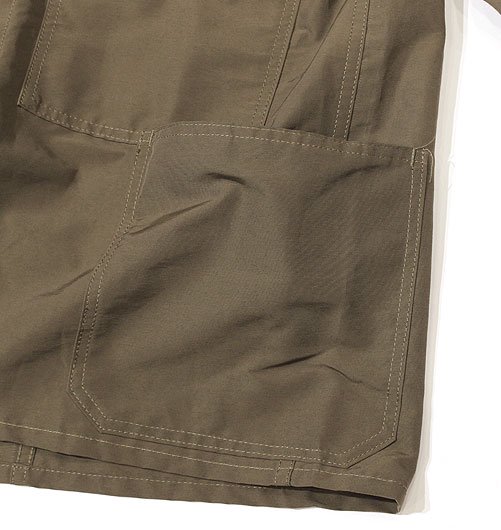SASSAFRAS『BLOWER BUD COAT』60/40クロス
(税込) 送料込み
商品の説明
SASSAFRAS『BLOWER BUD COAT』ササフラス ブロワーバドコート 60/40クロスのブラックです。
定価
約46,
ガーデニングウェアブランドとしてとても有名なササフラスの商品です。現行品で見ないので廃盤ににってるのかと思います。アーバンリサーチで購入。
前所有者:ワンシーズンのみ着用し、クリーニングご保管。
当方:試着のみ
特に、破損などは見当たりません。
流行りのオーバーサイズ気味に着れるサイズ感だとかとおもいますし、オーバージャケット的にも着れるジャケットです。
フロントボタンがダブル仕様で、ボタンを上まで留めるとネックをすっぽりと覆う形状に仕上がっています。 フロント、バックに多数のポケットがあり手ぶらでのお出かけには最適です!
素材
コットンナイロンを使用した60/40生地を使用しています。
サイズ
身幅 59 後身頃 79 ゆき丈88cm
素人の採寸です。
ラグランなので肩はあまり気にすることはないと思います。
色
ブラック商品の情報
| カテゴリー | ファッション > メンズ > ジャケット・アウター |
|---|---|
| 商品のサイズ | M |
| ブランド | ササフラス |
| 商品の状態 | 目立った傷や汚れなし |

have a golden day! スタッフブログ: 【SASSAFRAS】『BLOWER BUD COAT

SASSAFRAS『BLOWER BUD COAT』60 40クロス - アウター

have a golden day! スタッフブログ: 【SASSAFRAS】『BLOWER BUD COAT

Blower Bud TP Jacket(ブロワーバドTPジャケット)”60/40

SASSAFRAS BLOWER BUD TP JACKET SF-201704 - アウター

Yahoo!オークション - 美品☆SASSAFRAS ササフラス☆BLOWER BUD...

Blower Bud Coat – 14fw 『Sassafras』 –

sassafras blower bud coat ササフラス ササフラス 通販クーポン

SASSAFRAS (ササフラス) BLOWER BUD TP JACKET | MARBLE スタッフのブログ

SASSAFRAS - BLOWER BUD COAT MICROTTY OXFORD | IHATOVE SHOP BLOG

SASSAFRAS『BLOWER BUD COAT』60 40クロス - アウター

have a golden day! スタッフブログ: 【SASSAFRAS】『BLOWER BUD COAT

SASSAFRAS/ササフラス商品詳細 別注 Blower Bud TP Jacket

6T2790/未使用品 ササフラス ブロワーバドトランスプラントジャケット
未使用 SASSAFRAS ササフラス Blower Bud TP Jacket 60/40 SF-201704

SASSAFRAS BLOWER BUD TP JACKET SF-201704 - アウター | MARBLE 通販 【正規取扱店】

SASSAFRAS - DIGS CREW BUD JACKET 60/40 | IHATOVE SHOP BLOG

ササフラス Blower Bud Coat 試着のみの未使用品 - アウター

SASSAFRAS BLOWER BUD TP JACKET SF-201704 - アウター | MARBLE 通販 【正規取扱店】

SASSAFRAS (ササフラス) / Blower Bud TP Jacket 60/40(ブロワーバド

SASSAFRAS - DIGS CREW BUD JACKET 60/40 | IHATOVE SHOP BLOG

SASSAFRAS/ササフラス商品詳細 別注 Blower Bud TP Jacket
![SF-191514]SASSAFRAS (ササフラス) Blower Bud Coat / Blanket](https://makeshop-multi-images.akamaized.net/woodycompany/shopimages/86/28/2_000000012886.jpg)
SF-191514]SASSAFRAS (ササフラス) Blower Bud Coat / Blanket

SASSAFRAS (ササフラス) / Blower Bud TP Jacket 60/40(ブロワーバド

SASSAFRAS BLOWER BUD TP JACKET SF-201704 - アウター | MARBLE 通販 【正規取扱店】

SASSAFRAS】 Digs Crew Bud Jacket (60/40)!!! | Northrim Blog

Blower Bud TP Jacket(ブロワーバドTPジャケット)”60/40
未使用 SASSAFRAS ササフラス Blower Bud TP Jacket 60/40 SF-201704

SF-191514) SASSAFRAS (ササフラス) Blower Bud Coat / Blanket

sassafras blower bud coat ササフラス ササフラス 通販クーポン

have a golden day! スタッフブログ: 【SASSAFRAS】『BLOWER BUD COAT

Blower Bud Coat(ブロワーバドコート)”Blanket” - SASSAFRAS

SASSAFRAS BLOWER BUD TP JACKET SF-201704 - アウター | MARBLE 通販 【正規取扱店】
![SF-191514]SASSAFRAS (ササフラス) Blower Bud Coat / Blanket](https://makeshop-multi-images.akamaized.net/woodycompany/shopimages/86/28/7_000000012886.jpg)
SF-191514]SASSAFRAS (ササフラス) Blower Bud Coat / Blanket

6T2790/未使用品 ササフラス ブロワーバドトランスプラントジャケット

SF-191514) SASSAFRAS (ササフラス) Blower Bud Coat / Blanket

SASSAFRAS】 Digs Crew Bud Jacket (60/40)!!! | Northrim Blog

全天候に対応する高機能ワークコート ササフラス / FALL LEAF COAT

Blower Bud TP Jacket(ブロワーバドTPジャケット)”60/40
![SF-191514]SASSAFRAS (ササフラス) Blower Bud Coat / Blanket](https://makeshop-multi-images.akamaized.net/woodycompany/shopimages/86/28/13_000000012886.jpg)
SF-191514]SASSAFRAS (ササフラス) Blower Bud Coat / Blanket


商品の情報
メルカリ安心への取り組み
お金は事務局に支払われ、評価後に振り込まれます
出品者
スピード発送
この出品者は平均24時間以内に発送しています














